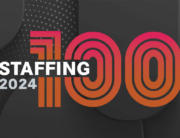The current presidential campaign is significant for the future of the staffing industry. As I see it, the overriding theme of the race is the struggle between progressive and conservative philosophies of business and government, which are roughly aligned, respectively, with the Democratic and Republican parties. Here is how that conflict arises in employment in my opinion.
Some progressives believe that there is only one proper kind of job. They know what that job’s terms of employment should be (pay, benefits, tenure, conditions and who should get the job), and they believe that employees and employers should not be allowed to agree to anything else. To some of them, wealth is a fixed quantity resource — owned by all of the people — that must be distributed by the government. Similarly, they consider the economy static, so that the government can dictate isolated parts of it without affecting other parts — for example, they believe that raising minimum wages increases workers’ incomes without killing any jobs.
On the other side, some conservatives believe that free markets eventually take care of almost everything and that government regulation is almost always counterproductive. Economics is dynamic, not static — for example, many of them believe that lowering tax rates produces higher total tax revenue by incentivizing work and investment. Some consider wealth a flexible, not a fixed, quantity; wealth other than natural resources is created by individuals, in proportion to the incentives and rewards for creating it.
Pay, Hiring and Benefit Mandates
Federal, state and local governments are enacting or planning to enact a steady stream of pay, hiring and benefit mandates, including minimum wages, living wages, sick leave, paid family leave, limits on exclusion of criminals, proliferation of protected categories of employees, comparable worth, pay parity of temporaries with permanent employees, and other expensive employee rights.
All of these mandates increase the operating costs of staffing firms. Regardless of national election results, there will always be pockets of progressive support for these measures. Neither the “stated bill rate” system nor the “pay to bill markup” system of pricing staffing services automatically compensates for these increased costs. It is more important than ever for staffing firms to keep rate guarantees short and to obtain “burden increase pass-through” clauses in staffing contracts.
Union Organizing
For several years, the Obama Administration’s prounion National Labor Relations Board has planned to change the law to allow unions to organize bargaining units that combine the employees of staffing customers with those of their staffing firm suppliers, against the wishes of both employers. Unions have even separately organized some groups of staffing firm workers. A Republican president and Senate would ensure that the NLRB’s pro-union bias could be reversed after January 2017. A Republican president with a Democratic Senate could leave a pro-union board in place until December of 2017. A Democratic president and Senate would indefinitely perpetuate the board’s pro-union bias.
Affordable Care Act
A Republican president, House, and Senate could accomplish the widely discussed repeal and replacement of the Affordable Care Act. A Democratic victory could lead to some revisions of ACA. But the proposals are still pretty vague.
One pending development is issuance of the regulations that would implement ACA’s ban on discrimination in favor of highly compensated employees. Nondiscrimination rules may seriously threaten the quality of the health coverage offered to in-house staff employees, who typically enjoy superior health coverage and are highly-compensated in comparison to assigned employees.
If the election produces a Democratic president and Congress, ACA could get much more difficult for staffing firms — a higher standard for MEC coverage, stricter lookback rules (which are critical to staffing), potential changes in the definition of “applicable large employer,” and aggressive reallocation of assigned employees as the customers’ common law employees.
Immigration
If comprehensive immigration reform follows the 2016 election and includes some kind of guest worker program, there may be a great opportunity for the staffing industry. About seven years ago, the Council on Foreign Relations suggested that the staffing industry would be ideally qualified and positioned to operate such a program. Staffing firms are probably more compliant with employment law than other employers, and they certainly know how to manage contingent workforces, but government sponsorship of this huge new category of business could come with debilitating government control.
Direct Industry Regulation
For decades, the PEO industry, embracing government regulation for historical and practical reasons, has lobbied successfully for PEO-specific laws at the federal and state levels. These laws impose rules for licensing, registration, bonding, auditing, screening of ownership, contracting practices, workers’ compensation and unemployment rating, and other requirements. Most (but not all) PEO laws expressly exclude temporary help services, but most of these laws do not define temporary help services thoroughly enough to exclude the payrolling and facilities management services that many temporary firms provide. This may be a lurking compliance issue for non-PEO staffing firms.
FLSA and Independent Contractor Remediation
On many fronts, it has become much riskier for businesses to use independent contractors and to treat employees as exempt under the Fair Labor Standards Act. Many employers, upon discovering that their good faith classification practices may not be fully legal, want to do the right thing by upgrading them. However, going back in time to do what possibly should have been done is administratively very hard, very expensive, and risky, because it may spotlight the legal issues or seem to admit past wrongdoing.
In most cases, changes in the law of contractors and exemptions make the law stricter for employers, so that fewer workers can be classified as independent or exempt. The good news is that changes in the law can provide opportunities for employers to mitigate past compliance risks without appearing to admit that they were noncompliant or attracting workers’ speculation that the reason for changes in their treatment is past noncompliance. You can, in effect, “blame the law” for changing (and challengeproofing) your practices.
Common Law and Joint Employment
A central assumption of the non-PEO staffing business is that the employees of a staffing firm can be assigned to do the work of clients without being employed by those clients. Yet several agencies and arms of government are eroding that assumption by liberalizing the legal tests for joint employment and by proposing involuntary reallocation of the common law employment relationship. State laws could help to slow this trend, like the recent laws confirming that franchisors are not joint employers of their franchisees’ employees.
Taking a Stand
I believe staffing is a business that could be eliminated with the stroke of a politician’s pen. It is vital for staffing firms, their owners, and their staff employees to become interested in political issues and active in supporting or opposing them. It may be tempting to believe that trade associations fully represent your interests, and in many cases they do. However, staffing people have a variety of political viewpoints and tactical styles. Association policies and tactics may or may not match yours.
There are past cases where members reversed the positions of industry associations, which, to their credit, faithfully executed the reversals. Your political input should be both direct and indirect, by making your positions and goals known to association representatives.







